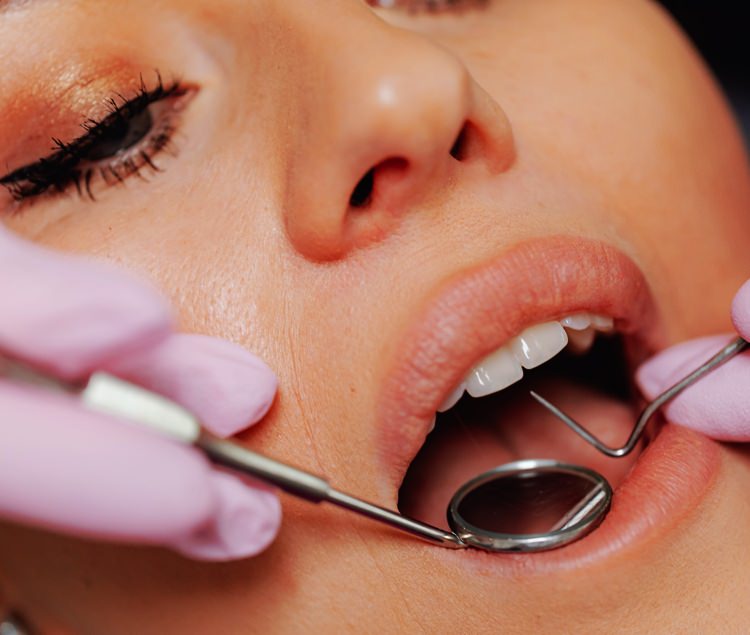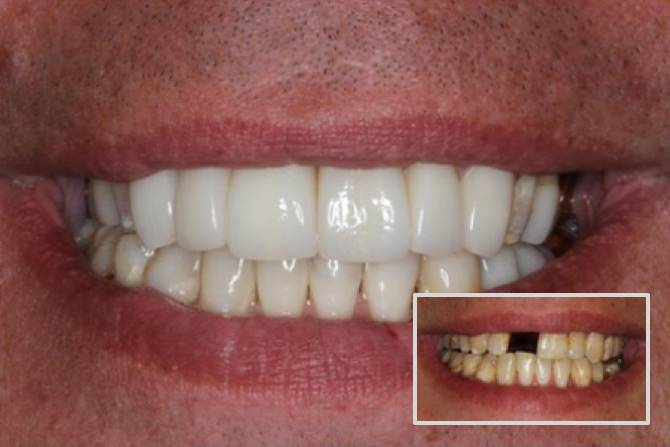Posted on Monday, August 14th, 2023 | 558 views
 Missing teeth can have a major impact on your life, affecting everything from your confidence and self-esteem to your overall health.
Missing teeth can have a major impact on your life, affecting everything from your confidence and self-esteem to your overall health.
In this article we cover the surprising connection with missing teeth and your overall health and explain how to easily create a positive impact on your physical wellbeing.
Common Symptoms That Arise from Missing Teeth
When a person has one or more missing teeth and they are not properly maintaining their oral health, they can experience the following physical symptoms:
- Difficulty speaking and eating.
- Changes in bite and jaw alignment.
- Increased risk of gum disease and tooth decay.
- Pain or discomfort in the jaw, face, and neck.
- Changes in facial structure.
- Reduced self-esteem and confidence.
- Increased strain on remaining teeth.
- Difficulty maintaining proper oral hygiene.
- Development of temporomandibular joint disorder (TMJ).
- Nutritional deficiencies.
Health Conditions Associated with Missing Teeth
Most of the health issues listed above can be addressed by placing dental implants but there are also many important behaviour and lifestyle changes that need to be made. There are also other dental solutions that can be more appropriate to solving an ongoing condition.
Conditions
The following are the most common health issues patients who’ve had teeth removed experience:
1. Difficulty of Speaking and Eating
Missing teeth can eventually greatly impact a person’s ability to speak properly and eat properly. They can also cause major discomfort and sometimes embarrassment.
How to solve this: for temporary relief, practice speaking slowly and clearly; chew food carefully and slowly and try to avoid hard and overly sticky foods. Overall, just be mindful of your eating and maintain good oral hygiene. You can speak to a registered dietitian to alleviate issues or consider speaking to your dentist.
2. Changes in Bite and Jaw Alignment
Tooth loss can also cause unwanted changes in jaw alignment and lead to problems with chewing and speaking. A change in jaw alignment can happen due to a variety of factors including:
- tooth loss
- injury
- genetics
- jaw clenching
- teeth grinding
- poor posture
These issues can result in a jaw disorder called Temporomandibular disorder (TMD) which is one of the most common results of jaw alignment issues if it is not corrected.
How to solve this: To relieve problems with changes in bite and jaw alignment without dentistry, a person can:
- practice jaw-strengthening exercises
- practice and maintain good posture
- avoid biting on hard food
- breath through their nose
- wear a nightguard (occlusal splint)
- sleep on their back and/or seek out physiotherapy
While certain dental procedures are often the most effective solution to this problem, these options can help alleviate some of the symptoms in the short term. Changes in jaw alignment can make a significant but usually unnoticeable impact on the health of your entire body and on your quality of life. Years of oral neglect could disrupt your entire system with symptoms including inflammation, neck discomfort, speaking difficulties and eating problems.
If you’re experiencing changes in your bite and/or jaw alignment, speak to a dentist that specializes in this form of oral therapy.
3. Increased Risk of Gum Disease and Tooth Decay
When teeth are missing, the surrounding gums and the remaining teeth are at an increased risk of gum disease and decay. Studies show—and most dentists agree—that replacing missing teeth with implants, bridges, or dentures not only improves oral function and aesthetics, but also helps prevent further bone loss.
How to solve this: If you have missing teeth and want to reduce the risk of gum disease you must maintain good oral hygiene practices every day. Brushing twice daily, flossing daily, and using a non-alcoholic mouthwash. You should also visit your dentist regularly for cleanings and checkups, reduce sugary foods and drink lots of water.
4. Pain or discomfort in the Jaw, Face, and Neck
Missing teeth can lead to pain or discomfort in the jaw, face, and neck due to increased strain on the remaining teeth and jaw joints. This type of pain can be caused because your teeth are shifting, jaw clenching or jaw grinding, and can lead to an irregular bite function.
How to Alleviate the Discomfort: To alleviate the pain or discomfort in the jaw, face, and neck caused by missing teeth before your appointment with your dentist, make sure to do the following:
- Practice excellent oral hygiene.
- Consider the benefits of replacing your missing teeth.
- Be mindful of reducing clenching and grinding.
- Breath through your nose.
- Use a splint or mouthguard.
There are also many over-the-counter pain relievers, heat and cold therapy presses, and supportive sleeping postures that substantially reduce the pain. Consult with your dentist for a proper diagnosis and treatment plan before giving up and just accepting the pain as a part of life.
5. Changes in Facial Structure
 The loss of teeth can result in changes in facial structure, (sunken cheeks and wrinkles) that can affect a person’s appearance and self-esteem. These facial structural changes can also impact the way a person bites, chews, and speaks, and lead to further discomfort and oral-functional difficulties.
The loss of teeth can result in changes in facial structure, (sunken cheeks and wrinkles) that can affect a person’s appearance and self-esteem. These facial structural changes can also impact the way a person bites, chews, and speaks, and lead to further discomfort and oral-functional difficulties.
The absence of a tooth will usually trigger a shift in the surrounding bone and tissues, which can cause the face to lose volume and start to look sunken in. It does not always happen, but if you notice it you may see the development of wrinkles and other signs of aging that also don’t appear to be normal.
How to solve this: Maintaining your facial structure after tooth loss can be accomplished through a combination of placing dental implants or bridges. Dentures can provide the support needed for facial tissues to maintain their strength too.
Implant or fixed denture supports act as a fixed solution that allow people with chewing issues to speak and smile without their teeth moving. Proper exercise, proper sleeping posture, proper hydration, facial massages, and a diet rich with vitamins will keep your skin and muscles healthy and prevent the loss of facial volume.
6. Reduced Self-esteem and Confidence
Anyone with missing teeth will eventually feel anxious or embarrassment because of their missing teeth. Missing teeth can reduce a person’s self-esteem substantially and lead to insecurity and self-consciousness. It’s normal for people with missing teeth to feel this way but it can play on one’s mental health, especially when one starts avoiding social spaces or groups of people in general.
How to solve this: These days is quite common for people turn to cosmetic dental procedures like implants, bridges, or dentures but if you have missing teeth, you can also consider counseling and lifestyle changes like maintaining good oral hygiene and following a healthy diet.
7. Increased Strain on Remaining Teeth
 The absence of teeth can cause increased strain on your remaining teeth and potentially lead to further tooth loss especially if you’re not practicing proper oral care.
The absence of teeth can cause increased strain on your remaining teeth and potentially lead to further tooth loss especially if you’re not practicing proper oral care.
This increased strain can lead to discomfort, pain, inflammation, and difficulties with eating and sleeping. In the long run this can lead to other health issues and a decrease in the quality of life.
How to solve this: Maintaining good—long-term oral hygiene, visiting your dentist regularly and take their advice if they suggest implants or bridges. For immediate remedies you can use a mouthguard to protect your remaining teeth and consider a bite adjustments to help distribute pressure evenly and reduce strain on the remaining teeth.
If you’re feeling the pressure between your teeth or gums after tooth loss, consult with your dentist. They’ll suggest an appropriate treatment and this early intervention can reduce the risk of developing a more serious or complex dental problem in the future.
Difficulty Maintaining Proper Oral Hygiene
When you have missing teeth, it can make it hard to properly clean certain areas of the mouth which in turn increases the risk of gum disease and tooth decay. This problem is quite common with missing teeth. They create gaps between the teeth and gums that make it difficult to reach with a toothbrush or even with flossing.
How to solve this: In the short term, you can reduce the severity of the problem by using a water flosser or an interdental brush on a daily basis. They are both good at cleaning the spaces between your teeth where toothbrush bristles won’t reach. They don’t remove plaque but they do remove lodged food that can cause the growth of bacteria in your mouth.
To reduce the bacteria in your mouth you can also try using tongue scrapers, chewing sugar-free gum or us a mouthwash that keeps your mouth hydrated. If you have swollen gums, you should see your dentist immediately, but before your visit, you can start using a soft-bristled toothbrush, so you don’t cause further irritation, inflammation, or gum swelling.
Gum disease is curable but there are major mental health and heart issues associated with it if it’s not resolved. And research has shown that at least 75% of the population has gum disease and don’t know it. Why? Because the underlying issues are not always easy to find without the help of a dentist or oral surgeon.
With missing teeth, maintaining proper oral hygiene is challenging but you’re tired of all the work, your dentist has several cost effect solutions that will definitely be life changing.
Development of Temporomandibular Joint Disorder (TMD)
 Missing teeth can and quite often do lead to the development of temporomandibular joint disorder (TMD). This is one of the major reasons dentists would rather preserve a tooth than remove it. When a person starts to develop TMD, they start feeling the increased stress on their jaw muscles and the surrounding muscle that surrounds their facial tissue.
Missing teeth can and quite often do lead to the development of temporomandibular joint disorder (TMD). This is one of the major reasons dentists would rather preserve a tooth than remove it. When a person starts to develop TMD, they start feeling the increased stress on their jaw muscles and the surrounding muscle that surrounds their facial tissue.
How to solve this: There are over-the-counter pain relievers and hot or cold compresses that can help some of the symptoms of TMD like Advil and Tylenol. Good posture and jaw-stretching exercises work well and so does wearing night guards.
If you have missing teeth and want to avoid developing TMD in the first place, get them replaced promptly with dental implants and crowns. They’ll restore your proper bite to its original structure and substantially reduce any strain on your jaw joints.
The quicker you address the problem the quicker you can reduce TMD symptoms or avoid them all together.
Nutritional deficiencies
Missing teeth make it hard to chew certain foods can potentially lead to nutritional deficiencies. Nutritional deficiencies usually occur in extreme cases where there’s multiple tooth loss, receding gums, and tooth decay, but even one missing tooth can cause a person to be forced to skip food that’s particularly nutritious for them.
How to solve this: In the short term, if you’re avoiding certain food because of your missing teeth, you can seek out alternative food choices that are easier to chew but contain the same vitamins and minerals. If possible, you can also make blended nutrition shakes with the food you have a hard time chewing.
Incorporating a balanced diet and supplementing it with vitamins and minerals will help prevent nutritional deficiencies, but if you want to better your quality of life, invest in a dental solution that’s long term, affordable, and avoids these problems altogether. Talk to your dentist.
Take Control of Your Oral Health – Replace Those Teeth
By now you probably realize the importance of oral health and that you shouldn’t put it off. If you’re experiencing any of these issues, take them seriously. Trust your dentist and reach out to them for a consultation, and if you live in Brantford, you can call today to see what your options are and gain control over the symptoms your missing teeth are causing you.
Read More...
About Dr. Pio Modi
After Dr. Modi graduated from McMaster University with an Honours B.Sc. in chemistry in 1997, he received his Doctorate of Dental Surgery from the University of Toronto in 2001. He began to practice dentistry in Brantford the following year. Throughout his career he's completed hundreds of hours of continuing education programs and has studied with some of the best educators in the industry.
Leave a Reply